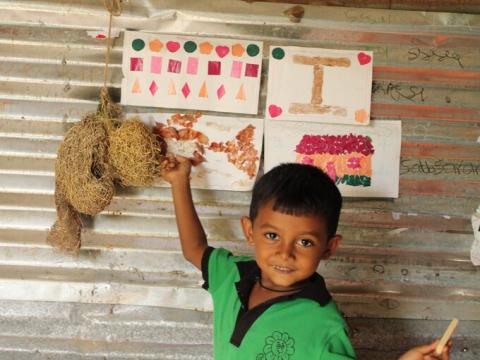No Food, No Preschool

Preschoolers are tantrum experts. They can throw a tantrum refusing to go to preschool, refusing to finish their food, demanding for things they like and the list goes on. But Chamod (5) is different. He doesn’t fuss over anything, except when he is unable to go to preschool.
“Unlike before, we are no longer able to buy him sweets or new clothes,” says Nimali his mother, “He understands and bears it up. But if I tell him that I’m unable to take him to preschool on a day, then you will see his tantrum. He cries non-stop.”
Going to preschool is not even an easy task for Chamod. He walks with his mother for two kilometers - and it takes his little feet nearly an hour - to get there. Although it tires him, he is never discouraged. And Nimali is committed to taking him to preschool every day except when she’s unable to bring food to the preschool.
The meal programme at the preschool at that time, assigned each mother of the preschoolers to provide the meals for the children once a month. Providing a nutritious meal for 40 tummies was a big expense for mothers like Nimali even if it was only once a month. At those times, she decides to keep Chamod from preschool.
Life has been extra hard for this economically vulnerable family, especially in the last three years. With the economic crisis that followed the pandemic, the quarry where Chamod’s father – Gamini worked, closed down, leaving him out of a job and cutting off the only income source for the family.
“But we didn’t want to give up,” Nimali says, “We both started to bake bricks using the soil from our land. However, we didn’t realize the soil we had was not ideal for bricks and our attempt failed.”
“Then I started to cultivate a home garden so that our family can have something to eat but most of all so that I can prepare meals for the preschool with what I have in my garden,” she says, “I started to grow a variety of vegetables.”
But then World Vision started a mid-day meal program in Chamod’s preschool through the RISE Lanka project. The project, supported by the Australian Government through the Australian Humanitarian Partnership, is an immediate response to children and families who are becoming food-insecure due to the current economic crisis in Sri Lanka. The Ministry of Education of the Government of Sri Lanka has implemented efficient methods to give primary school students a nutritious meals Under the "School Nutrition Program". But, the preschoolers (3-5) who are in a critical age that occupying rapid physical, mental, social and spiritual growth, however, do not receive such assistance. In order to close the gap, 1,500 preschoolers will get assistance from feeding programs under the project.
Project provides nutritional mid-day meals for 1,500 children (ages 3-5) in 100 preschools in addition to strengthening agriculture and dairy farming systems in Bibila, Welikanda, Lunugala, Rideemaliyadda and Meegahakiula in the Uva and the North Central Provinces to support medium-term recovery.
“Chamod loves the food at the preschool,” Nimali says, “Everyday he would talk about what he ate and how tasty it was. He comes home with a full tummy and doesn’t get hungry even till evening. I don’t have enough words to thank World Vision for this nutritious meal.”
Nimali continues to grow her garden so that she can provide nutrition in her family’s meals at home. She also plans to earn an income by selling the excess produce. Nimali was aware that despite her best efforts, she was unable to provide young Chamod and his sister with the sufficient nutrients they needed with the fresh vegetables from the garden.
However, World Vision then came to their aid. Before the meal program, little Chamod weighed 12.1 Kg and just one month after the meal program he weighed 13.40 Kg which is a great progress. So, substitute the numbers, that is the weight of happiness in Nimali's heart!
Author: Madara Gunawardana, Communication and Reporting Officer, AHP RISE Lanka Project